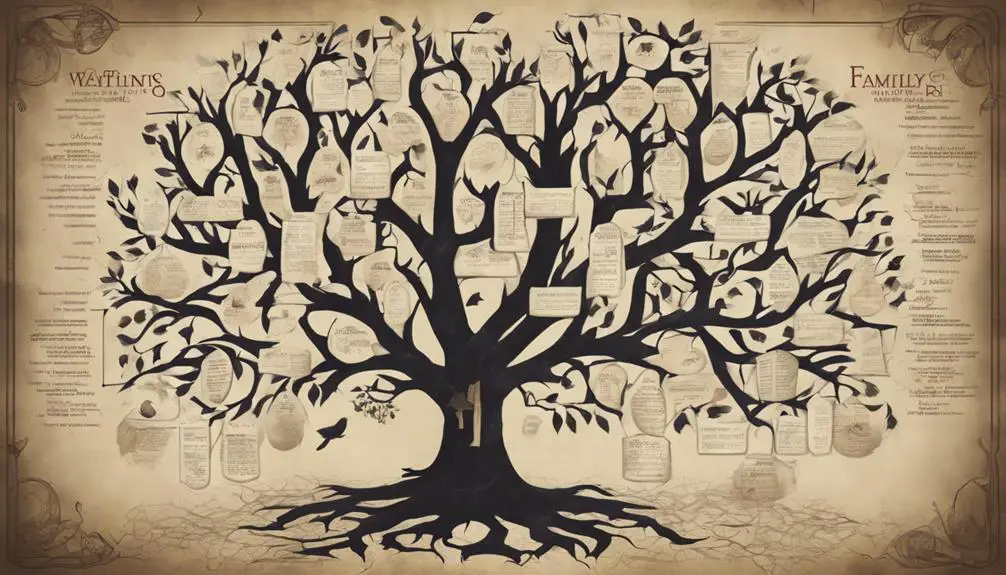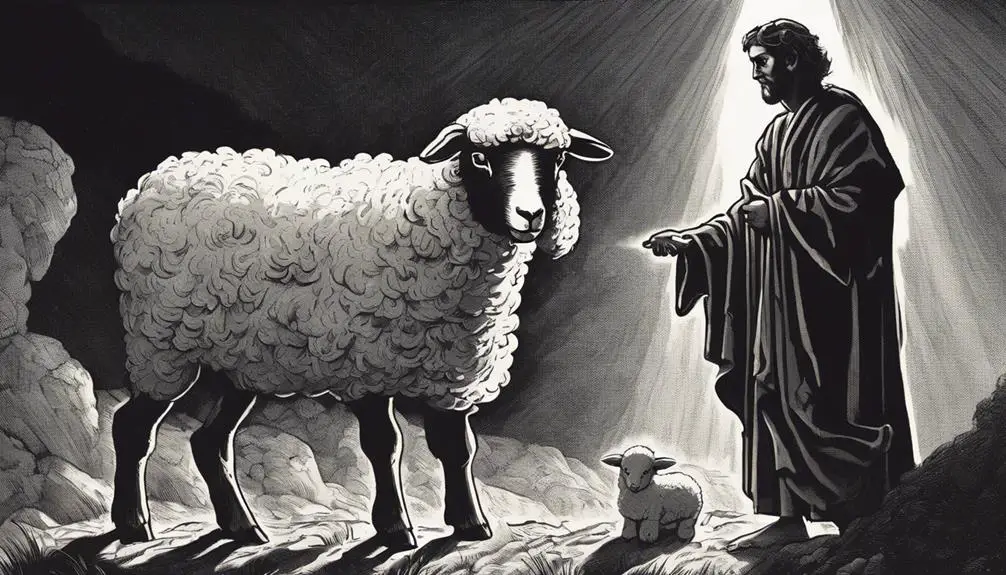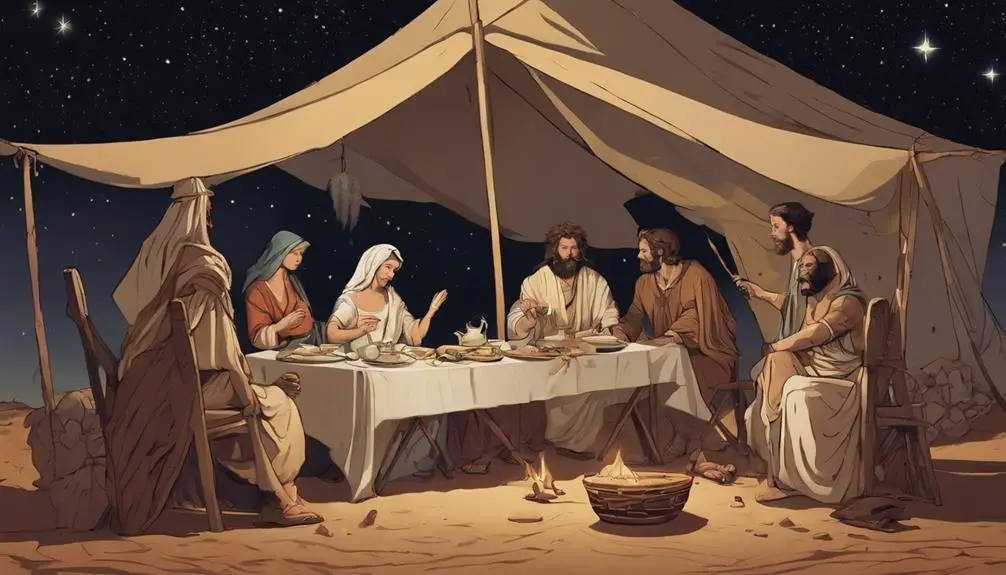Yielding insights into modern dilemmas, Biblical tales of dysfunctional families reveal timeless lessons on conflict, favoritism, and reconciliation.

Dysfunctional Families in the Bible
Consider the story of Jacob, Esau, and the stark parental favoritism that fueled their rivalry. You've likely heard how Isaac favored Esau, while Rebekah preferred Jacob, setting the stage for deception and discord that resonates with many even today.
This biblical narrative isn't just an ancient tale; it's a mirror reflecting the complexities and challenges of familial relationships throughout generations. As you think about this, you might find yourself wondering how these dynamics influence personal growth and sibling bonds.
Let's explore together how understanding these stories can shed light on modern family issues.
Key Takeaways
- Biblical narratives often illustrate the enduring impact of family dysfunction across generations.
- Dysfunctional family dynamics, such as favoritism and betrayal, are recurrent themes in Bible stories.
- The Bible presents opportunities for reflection on the causes and consequences of family dysfunction.
- Healing and recovery within biblical contexts underscore the potential for overcoming family dysfunction through faith and community support.
Cain and Abel's Rivalry

The rivalry between Cain and Abel serves as an early testament to the complexities of sibling relationships and jealousy within the biblical narrative. This story exemplifies how sibling jealousy can lead to dire moral consequences, highlighting the destructive nature of envy and competition within a family unit. You'll notice that Cain's jealousy of Abel's favor with God escalates to a point of no return, culminating in the ultimate transgression: fratricide.
This narrative isn't just a tale of murder; it's a profound exploration of the human condition, examining the depths of jealousy and how it can corrupt one's moral compass. The moral consequences of Cain's actions aren't merely punitive; they're illustrative of a broader divine justice, showcasing how one's internal turmoil and inability to manage jealousy can lead to irreversible outcomes.
In analyzing this story, it's clear that the biblical text doesn't merely recount events but delves into the psychological and spiritual ramifications of sibling rivalry. It serves as a cautionary tale about the dangers of letting jealousy fester, underscoring the importance of self-awareness and emotional regulation in navigating sibling dynamics.
Noah's Family Discord

Shifting focus from the destructive power of sibling rivalry exemplified by Cain and Abel, we encounter another profound example of familial discord in the story of Noah and his family. The narrative, rich in moral and ethical complexities, highlights the fragility of human relationships, even in the aftermath of divine intervention and salvation.
- Noah's Drunkenness: After the flood, Noah's lapse into drunkenness serves as a pivotal moment, exposing the vulnerabilities within his family structure. This incident not only reveals Noah's human flaws but also sets the stage for conflict among his sons, leading to further divisions and curses.
- The Rainbow Covenant: While the rainbow symbolizes God's promise never to destroy the earth by flood again, it also marks a new beginning for humanity. This covenant, however, doesn't erase the underlying tensions within Noah's family, illustrating that divine promises coexist with human imperfections.
- Ham's Actions: The disrespect shown by Noah's son, Ham, underscores the complexities of familial respect and hierarchy. His behavior leads to Noah's curse upon Ham's son, Canaan, highlighting how individual actions can have lasting effects on future generations.
- Legacy of Discord: The episode of Noah's drunkenness and its aftermath encapsulate the enduring theme of familial discord. It demonstrates how, despite divine interventions and covenants, human families continue to grapple with internal conflicts and moral dilemmas.
This story, while ancient, offers timeless insights into the challenges of maintaining family unity and integrity in the face of human frailties and divine expectations.
Abraham, Sarah, and Hagar's Triangle

ARTICLE TITLE: Dysfunctional Families in the Bible
PREVIOUS SUBTOPIC: 'Noah's Family Discord'
CURRENT SUBTOPIC: 'Abraham, Sarah, and Hagar's Triangle'
Within the intricate narrative of Abraham, Sarah, and Hagar, we observe a complex web of desires, decisions, and consequences that unveil another layer of familial discord in biblical stories. This triangle not only explores personal relationships but also delves into the power dynamics and cultural implications that influence their interactions.
Character |
Role/Impact |
|---|---|
Abraham |
The patriarch, whose decisions influence the course of both Sarah and Hagar's lives. His actions are central to the unfolding of the narrative. |
Sarah |
Experiences jealousy and insecurity, leading to the mistreatment of Hagar. Her decisions reflect the cultural implications of barrenness and legacy. |
Hagar |
A servant who becomes a central figure due to her capacity to bear Abraham a son, highlighting the power dynamics at play. |
Ishmael |
His birth from Hagar shifts the family dynamics, intensifying the conflict and consequences among the characters. |
Isaac |
Symbolizes the fulfillment of a divine promise, yet his birth escalates the familial discord, marking a significant point in the narrative. |
This tableau not only depicts individual motivations but also illuminates the broader themes of power, cultural norms, and their impact on family structures.
Jacob, Esau, and Parental Favoritism

Within the biblical narrative, Jacob and Esau's story starkly illustrates how parental favoritism can sow seeds of discord and shape destinies in profound ways. This tale, deeply embedded in the fabric of Judeo-Christian teachings, serves as a poignant example of the long-term consequences that parental preferences can have on their offspring.
- Birthright Bargaining: The narrative begins with Esau selling his birthright to Jacob for a simple meal. This moment, driven by Esau's immediate hunger and Jacob's opportunism, sets the stage for future conflict. It underscores the value placed on material and spiritual inheritance and how easily it can be manipulated in a family dynamic marred by favoritism.
- Blessing Deception: The climax of their story involves Jacob, with his mother Rebekah's encouragement, deceiving their father Isaac to receive the blessing meant for Esau. This act of trickery not only deepens the rift between the brothers but also highlights the lengths to which favored children might go to secure their status.
- Parental Preferences: Isaac's favoritism towards Esau and Rebekah's towards Jacob creates an environment ripe for manipulation and deceit.
- Legacy of Conflict: The consequences of these actions ripple through generations, illustrating how familial dysfunction, once seeded, can grow and perpetuate itself.
Joseph and His Brothers' Betrayal

The saga of Joseph and his brothers delves into the destructive impact of envy and betrayal within a family, further compounding the theme of dysfunctional familial relationships in biblical narratives. At the heart of their discord lies Joseph's ability in dream interpretation, a gift that foretells his rise above his siblings, inciting their jealousy. This envy culminates in an act of profound betrayal, as his brothers sell Joseph into slavery, a decision that fractures the family unit and sends Joseph on a long reconciliation journey.
Joseph's experiences in Egypt, from his initial enslavement to his eventual ascent to a position of power, underscore the complex interplay between personal destiny and familial bonds. His adeptness at interpreting dreams not only facilitates his rise but also becomes a crucial element in the eventual reunification with his family. The narrative arc from betrayal to reconciliation illuminates the possibility of healing and redemption within even the most fractured of familial relationships.
Analyzing Joseph's story, it's evident that the reconciliation journey is fraught with challenges, yet it highlights a powerful message: forgiveness and understanding can mend deep-seated familial rifts, offering a path out of dysfunction. This story serves as a profound exploration of the themes of envy, betrayal, and the redemptive power of forgiveness within the context of family dynamics.
Frequently Asked Questions
How Do Modern Psychologists Interpret the Long-Term Psychological Effects on Individuals Who Grew up in Dysfunctional Biblical Families?
When you explore the long-term psychological effects on individuals from dysfunctional families, modern psychologists often apply attachment theory. They analyze how early family dynamics shape one's ability to form healthy relationships.
Additionally, resilience strategies are a focal point, examining how individuals overcome adverse childhood experiences. Through this lens, you gain insights into coping mechanisms and the potential for personal growth despite early challenges, offering a comprehensive understanding of the impact on psychological well-being.
In What Ways Have Contemporary Religious Leaders and Communities Addressed or Rectified the Moral Lessons Derived From These Dysfunctional Family Stories?
Contemporary religious leaders and communities have actively engaged in reinterpreting these stories, emphasizing family reconciliation and healthier moral lessons. Through sermons, discussions, and educational programs, they've offered new perspectives that highlight the importance of understanding, forgiveness, and unity within families.
This shift in community interpretations encourages members to reflect on their own family dynamics and promotes a more compassionate and empathetic approach to resolving conflicts and strengthening familial bonds.
Are There Any Archaeological or Historical Evidences That Corroborate the Familial Conflicts Described in the Bible, or Are These Narratives Purely Theological?
You're looking into whether archaeological or historical evidence supports the biblical narratives of familial conflict, or if these stories are purely theological.
When exploring family archaeology, it's challenging to find concrete evidence that directly corroborates these specific disputes. However, some findings offer context to the era's lifestyle, indirectly supporting the narratives' plausibility.
Theological verification, on the other hand, analyzes the texts themselves, seeking moral and ethical lessons rather than empirical evidence.
How Do These Stories of Dysfunctional Families in the Bible Influence Modern Legal Systems and Societal Norms Regarding Family Dynamics and Conflict Resolution?
You're exploring how stories influence modern legal systems and societal norms, specifically regarding family dynamics and conflict resolution. These narratives have profound cultural impacts, shaping perceptions and attitudes toward familial disputes.
Legal precedents often draw from historical and societal contexts, including those found in ancient texts. Thus, by examining these tales, you're delving into how they've contributed to contemporary understandings of family law and societal expectations around resolving conflicts within families.
What Are the Implications of These Biblical Dysfunctional Family Stories on the Concept of Divine Providence and Free Will in Theological Discourse?
When exploring the implications of these stories on divine providence and free will, you're delving into how they showcase divine intervention amidst human chaos. This narrative thread emphasizes the moral ambiguity present in human decisions and God's plans.
It suggests that, despite human flaws, there's a larger divine narrative at play, challenging you to consider the balance between free will and predetermined paths in theological discourse.
Conclusion
In analyzing these biblical narratives, it's evident that dysfunctional family dynamics aren't a modern phenomenon. From Cain and Abel's deadly rivalry to Joseph's betrayal by his brothers, these stories reflect deep-seated issues of jealousy, favoritism, and conflict.
The recurring theme of parental favoritism, particularly seen in the cases of Jacob, Esau, and Joseph, underscores the profound impact of familial relationships on individual destiny. Thus, these narratives offer timeless insights into the complexities of family life and human behavior.



Sign up